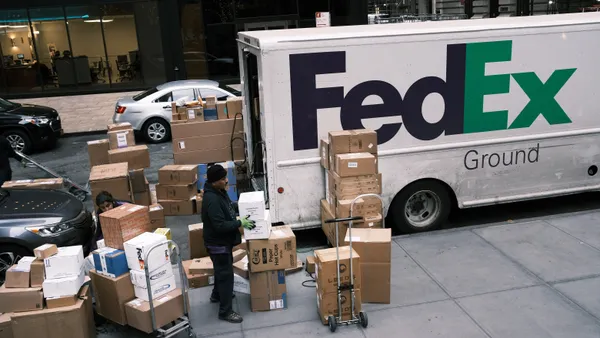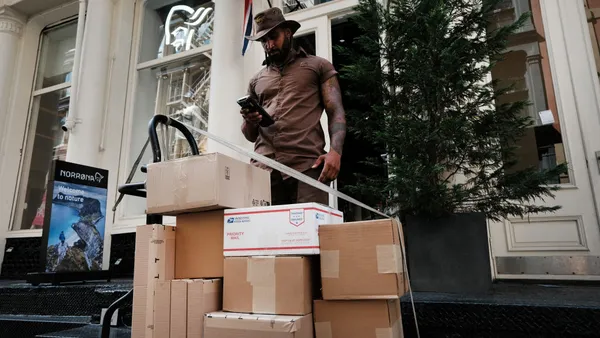Dive Brief:
- More than 60% of logistics companies will use data and artificial intelligence to ship goods ahead of purchase orders in the next three to five years, according to an Ericsson survey of nearly 2,000 logistics professionals from China, Germany, Sweden and the United States. Of the individuals surveyed, 667 were in decision-making roles
- Seven in 10 decision makers surveyed said their business will need to be part of a broader logistics industry information sharing system, to have the visibility required to send the right type and quantity of goods to a client before they've been ordered, which Ericsson described as "preemptive logistics."
- About one-third of respondents said the inability to quickly share accurate information between customers and suppliers is a roadblock for their business. Disruption from the COVID-19 pandemic has amplified that challenge.
Dive Insight:
In an ideal preemptive logistics world, shippers would be able to "predict the demand for products, services and solutions before customers even make purchase decisions ... [and] all parties will be able to see where and in what condition the shipments are (age, temperature, vibration, etc.)," according to Ericsson's report.
This requires firms to invest internally in digital transformation, work with supply chain partners to ensure interoperability between systems and develop a level of trust that permits information sharing in the first place, the report stated, citing the industry's "substantial lack of transparency."

Firms have many ways to improve transparency internally and with supply chain partners — from investing in digital management systems and 5G connectivity for warehouses to container and order tracking technologies, according to the survey. A majority of respondents said they're considering investing in blockchain to collect and share data securely.
Some firms, notably Amazon, are in-housing logistics to digitally integrate their supply chains, the report noted. However, going the "Amazon route" is not feasible for all players due to resource or cost restraint, making outsourcing and data sharing across the supply chain necessary.
The report said preemptive logistics and the pandemic could change warehousing networks in the coming years. Localized warehouses are likely to become more common, as opposed to shipping orders from a centralized warehouse, to reach customers quickly and to have enough stock to absorb demand shifts, the report said.
One way some firms are achieving this, particularly as e-commerce demand has exploded in recent months, is to convert or hybridize underperforming big-box retail properties into fulfillment centers for online order pickup or delivery.
The pandemic "is showing the vulnerability with globalization and the whole concept of lean production. There are naturally limits to how much you could increase warehousing, so we might be talking about expanding it enough to last a couple of extra weeks," said Fredrik Sjöholm, an economics professor at Lund University who was interviewed for the report.
Firms could use local networks to handle more regional shifts in demand, particularly now when varying coronavirus infection rates mean some U.S. states are more "open" than others.
Correction: A previous version of this article misattributed report authorship to Fredrik Sjöholm, who was quoted but did not co-author the report.














